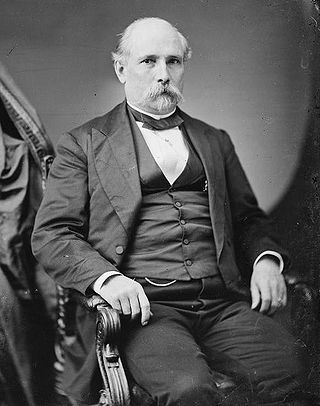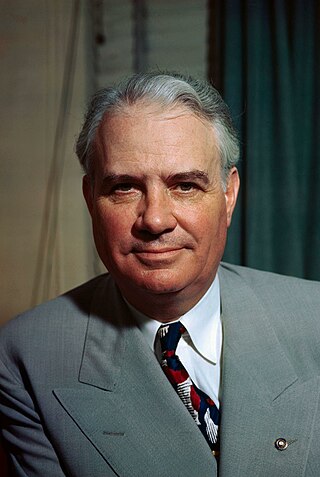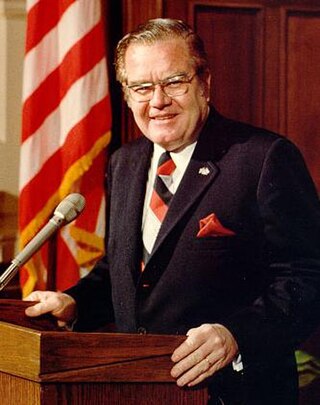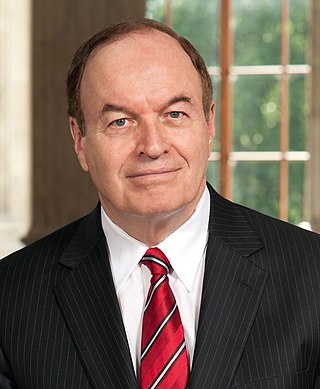
David Adams Richards is a Canadian writer and member of the Canadian Senate.

Huey Pierce Long Jr., nicknamed "The Kingfish", was an American politician who served as the 40th governor of Louisiana from 1928 to 1932 and as a United States senator from 1932 until his assassination in 1935. He was a left-wing populist member of the Democratic Party and rose to national prominence during the Great Depression for his vocal criticism of President Franklin D. Roosevelt and his New Deal, which Long deemed insufficiently radical. As the political leader of Louisiana, he commanded wide networks of supporters and often took forceful action. A controversial figure, Long is celebrated as a populist champion of the poor or, conversely, denounced as a fascistic demagogue.

James Lusk Alcorn was a governor, and U.S. senator during the Reconstruction era in Mississippi. A Moderate Republican and Whiggish "scalawag", he engaged in a bitter rivalry with Radical Republican Adelbert Ames, who defeated him in the 1873 gubernatorial race. Alcorn was the first elected Republican governor of Mississippi.

Albert Benjamin "Happy" Chandler Sr. was an American politician from Kentucky. He represented Kentucky in the U.S. Senate and served as its 44th and 49th governor. Aside from his political positions, he also served as the second Commissioner of Baseball from 1945 to 1951 and was inducted into the Baseball Hall of Fame in 1982. His grandson, Ben Chandler, later served as congressman for Kentucky's Sixth District.

John William Bricker was an American politician and attorney who served as a United States senator and the 54th governor of Ohio. He was also the Republican nominee for Vice President in 1944.

Ernest Henry Gruening was an American journalist and politician. A member of the Democratic Party, Gruening was the governor of the Alaska Territory from 1939 until 1953, and a United States Senator from Alaska from 1959 until 1969.

James Beauchamp Clark was an American politician and attorney who represented Missouri in the United States House of Representatives for thirteen terms between 1893 and 1921 and served as Speaker of the House from 1911 to 1919.

William King was an American merchant, shipbuilder, army officer, and statesman from Bath, Maine. A proponent of statehood for Maine, he became its first governor when it separated from Massachusetts in 1820. He was the half-brother of Rufus King, who was a member of the Confederation Congress from Massachusetts, delegate to the Constitutional Convention of 1787, served as United States Senator from New York, and as Minister Plenipotentiary to the Court of St. James from 1796 to 1803 and again from 1825 to 1826.

Henry Toole Clark was the 36th Governor of the U.S. state of North Carolina from 1861 to 1862 during the American Civil War.

Dolph Briscoe Jr. was an American rancher and businessman from Uvalde, Texas, who was the 41st governor of Texas between 1973 and 1979. He was a member of the Democratic Party.

Carl Cameron is an American journalist and was a reporter for Fox News for two decades. In 2019 he founded the progressive news aggregator, Front Page Live, where he is chief political correspondent.

Olin DeWitt Talmadge Johnston was an American politician from the US state of South Carolina. He served as the 98th governor of South Carolina, from 1935 to 1939 and again from 1943 to 1945. He represented the state in the United States Senate from 1945 until his death from pneumonia in Columbia, South Carolina in 1965. He has become infamously remembered for denying clemency to George Stinney, a 14 year-old African American boy who was wrongfully sentenced to death in 1944 after a trial that lasted for one single day, a conviction overturned 70 years later.

George McIntosh Troup was an American politician from the U.S. state of Georgia. He served in the Georgia General Assembly, U.S. House of Representatives, and U.S. Senate before becoming the 32nd Governor of Georgia for two terms and then returning to the U.S. Senate. A believer in expansionist Manifest Destiny policies and a supporter of native Indian removal, Troup was born to planters and supported slavery throughout his career. Later in his life, he was known as "the Hercules of states' rights."

Morgan Foster Larson was an American Republican politician who served as the 40th governor of New Jersey.
The Roark family is a fictional dynasty from Frank Miller's graphic novel series Sin City.

Eugene Noble Foss was an American politician and manufacturer from Massachusetts. He was a member of the United States House of Representatives and served as a three-term governor of Massachusetts.

Rufus Brown Bullock was a Republican Party politician and businessman in Georgia. During the Reconstruction Era he served as the state's governor and called for equal economic opportunity and political rights for blacks and whites in Georgia. He also promoted public education for both, and encouraged railroads, banks, and industrial development. During his governorship he requested federal military help to ensure the rights of freedmen; this made him "the most hated man in the state", and he had to flee the state without completing his term. After returning to Georgia and being found "not guilty" of corruption charges, for three decades afterwards he was an esteemed private citizen.

The Tennessee Democratic Party (TNDP) is the affiliate of the Democratic Party in Tennessee. The party was founded in 1826 initially as the Jacksonian Party. The Tennessee Democratic Party was born out of President Andrew Jackson's populist philosophy of Jacksonian democracy in the mid to late-1820s. After Jackson left office, the Democratic Party struggled in the state as the Whig Party would go on to be the dominate party in Tennessee until its collapse after the 1852 Election. Prior to the Civil War, as a result of the collapse of the former Whig Party, the Democratic Party became the dominate party in the state. After the war ended, the Republican Party would be the dominate political party during Reconstruction, but once Reconstruction ended, the Democratic Party would dominate Tennessee Politics up until 2011 when the Republican Party would gain firm control of Tennessee State Government.
Steven James Robert Whan is an Australian politician who has served as Minister for Skills, TAFE and Tertiary Education since 2023. He has represented the electoral district of Monaro in the New South Wales Legislative Assembly for the Labor Party since 2023, after previously representing the seat from 2003 until 2011. He was a member of the Legislative Council from 2011 to 2015. Whan served as Minister of Emergency Services, Minister for Small Business and Minister for Rural Affairs in the Rees and Keneally ministries from 2009 to 2011. Whan lives in Queanbeyan with his wife and two children. Whan is a member of Labor Right.

The 2016 United States Senate election in Alabama was held on November 8, 2016, to elect a member of the United States Senate to represent the State of Alabama, concurrently with the 2016 U.S. presidential election, as well as other elections to the United States Senate in other states and elections to the United States House of Representatives and various state and local elections.


















